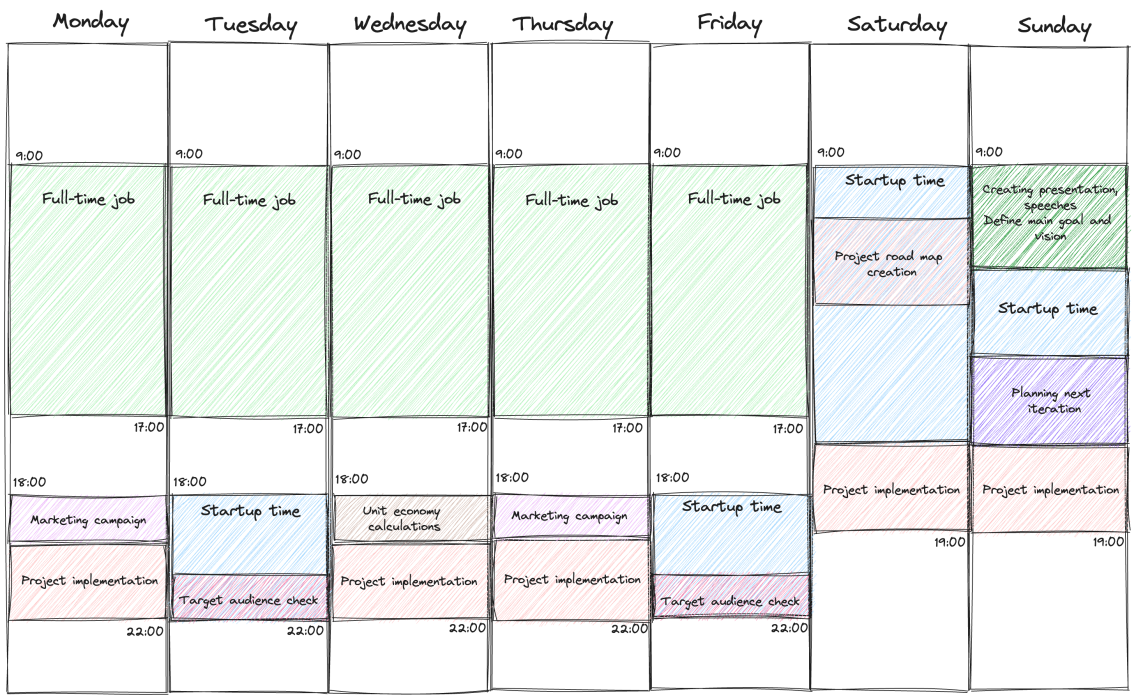Have you ever thought about unicorn startups, young billionaires and wondered how they achieved it? Have you ever been baffled by productive people running around like crazy success rabbits managing different projects? Do you ever feel miserable because you can’t be as productive as them?
If the answer to any of these questions is “yes,” then this article is for you. It is my reflection on the experience of launching a startup, stumbling along the way and correcting mistakes.
About the startup: it was a platform for teaching programming languages in a gaming format. Users could program their own characters and go through a story. Our team consisted of five engineers who were trying to make our dream project a reality.

How many hours are there in your day?
Time is the most important resource that everybody has. If you open any book about startups, you will find they say that your project must be your passion since you will be spending all your time making your dream come true. But how much time exactly?
Everyone can imagine an ordinary working day and their productivity during that time. It is a good time estimation that combines not only time but also our effort. The following narration assumes 8 hours per day as the basic cost of doing a startup, which makes up 40 hours in total per week.
Dream-filled bunnies
What comes to mind when you think about the most carefree period of your life? I bet it’s your student years. When you are in your final year as a student, you have enough free time to fill a 40-hour working week. And (probably) still living with your parents which gives you additional time since they take care of routine issues. So it could be the perfect time to start.
And that’s exactly what my team and I did, we started our project in the final years of university and spent all our free time on it. We would stay up all night implementing new features, memorising our pitches on the subway, and keep moving forward despite mistakes and a bunch of problems.
However, after some time, when I gained experience in commercial development and participated in implementing products in big teams and departments, I realised what our team lacked to succeed.
The first thing our team faced was our inability to work, or better to say, a lack of knowledge on how to work. We had never worked anywhere before, we had never worked in teams. We didn’t really know how to interact with each other, how to build a work process, or didn’t even understand some work processes. It is important to agree on work processes and define team agreements on how the team will work.
The second issue was a lack of corrective work. We used the lean startup methodology, but it was only applied to product or product research, we didn’t use it for our own processes and interactions. But lean methodology needs to be applied to everything to understand why something doesn’t work for you. You need to continuously improve not only the product but also yourselves.
And the last point is equality. People around the world are fighting for it, and in a small startup, it, ironically, became a problem. When team members are equal in power, decision-making, and idea implementation, it leads to time-consuming discussions all the time, making people tired. At some point, people don’t want to take part in discussions. And they give the green light to everything, even if it’s a stupid idea. They hope that it will die in the next iteration. It is important to have a decision maker in the team who has the final word in conversations or decides what to do next.
So, it’s fair to say that student years is a great point to start, and some people succeed at this stage. Remember Mark Zuckerberg?
What about employed rabbits?
Let’s look at people who have full-time jobs and decide to start working on their own projects. How can they find the time to work on an extra project alongside their existing workload?
Let’s try to fulfil the timetable and add startup time, work on startup 40 hours per week, one of the variant of time distribution is below. 4 hours per working day and 10 hours per weekend day = 40 hours

Looks crazy, right?
As many experts have said, people need 6-7 hours of sleep to be healthy and should also engage in sports exercises, at least, twice a week. And you need to find time for it in such a busy schedule.
One of the issues that can arise with such a lifestyle is:
- Losing connections/interactions with family
- No time for friends
- No personal life
- Burning out
- Dissatisfaction from your primary employer about your second project
- Special conditions in the contract with your primary employer that state all work belongs to the company
Each member of our team found a full-time job, and we worked according to this schedule. It was okay for the first few months, but later our productivity gradually decreased. We faced the issues mentioned above, and our personal lives and the need to rest took over.
Yet, our team encountered another problem: we delivered less functionality → which led to a decreasing trend in new user participation → we got less user feedback, and demotivation within the team. It felt like the project was frozen in place, and our team’s productivity suffered as a result.
If your startup doesn’t bring you any money yet, feedback is the only fuel for your motivation.
What other issues might you face when creating a startup?
There are more obstacles to making a startup, especially if it is your first attempt.
Multi-tasking/Multi-responsibilities
At the early stages of a startup, everybody does everything: project implementation, checking the target audience, creating marketing campaigns, creating speeches/presentations, building pricing, calculating unit economics, creating project roadmaps, and so on. Here’s how the schedule may look like with such activities:

Lack of knowledge
First, you need to learn how to do things before you actually do them. This requires self-education. Let’s add it to the time table:
 Management problems
Management problems
If there are even two people in the team, they need to sync with each other and make plans. This takes even more time:
 Indeed, building a startup involves a wide range of activities, and product implementation alone may account for only a fraction of the overall time required. It’s common for startup founders to find themselves dedicating a significant portion of their time and energy to their venture. However, it’s important to approach this with caution, as constantly decreasing your free time can be challenging and unsustainable.
Indeed, building a startup involves a wide range of activities, and product implementation alone may account for only a fraction of the overall time required. It’s common for startup founders to find themselves dedicating a significant portion of their time and energy to their venture. However, it’s important to approach this with caution, as constantly decreasing your free time can be challenging and unsustainable.
Finding a balance between your personal life and your startup is crucial. While it’s natural to invest considerable time and effort into your startup, it’s essential to maintain a healthy work-life balance, even in the midst of building a startup.
Is there any way to launch a startup while working a regular full-time job?
Is there any way to work on your own product/startup and still have a normal working week? Here are some possible solutions.
Find established rabbits
Take part in an existing startup, which already has an investor, in its early stages.
There are many people who have already established their own startups and reached the first round of investments. By joining such startup, you will experience all the stages firsthand and gain real experience in launching and growing a business.
Startup conferences and competitions are common places to find these opportunities. Be proactive and demonstrate to the startup team that you are the person they need at this stage. These places are also great for motivation as they can energise and inspire you. My team really loved visiting them and presenting our project, we got valuable feedback and found partners.
As the startup grows, it may also use more traditional methods to find people, such as LinkedIn and other job portals. Pay attention to positions in small and fast-growing companies.
Pros: You can gain important experience in making a startup and still have a normal working week.
Cons: It wouldn’t be your project or your idea. However, if you’re lucky, you may find something similar to your idea since every startup has competitors.
Save enough carrots for the future
The idea is to collect enough money to quit your current job and fully dedicate yourself to the startup. You will need money to sustain your normal living expenses for 1-2 years. This timeframe should give you enough time to understand the viability of your startup and meet the initial conditions required for securing the first round of investments.
To embark on a startups journey, you’ll need to collect money for:
- housing for 2 years: this includes utility bills and rental expenses.
- common monthly expenses multiplied by 24: this covers expenses such as food, clothing, and other necessities.
- operational startup expenses: set aside a reserve for any unexpected issues or expenses that may arise during your project. That might include costs for server rental, conference tickets, outsourcing payments and etc. The amount required for this reserve depends on the startup and its co-founders. However, as a starting point, it’s recommended to have an amount equivalent to the average annual salary in your country multiplied by 12. This reserve can also provide some financial flexibility to hire part-time employees or freelancers to assist you.
Once you have collected this amount of money, you will be able to quit your current job and fully focus on pursuing your dream. It’s also smart to save where you can by applying for discounts or product credits of established companies, such as Infobip.
Pros: You can maintain a normal personal life and work-life balance.
Cons: It is a long journey that requires patience and a strong will to see it through.
Find the rabbit with carrots to spare
Getting an investment is a good way to handle the problem because you can receive money for your living expenses like from a regular job. But, obtaining funding can be difficult. Potential investors will check the metrics of your product and set certain expectations.
- The startup should have a large audience and potential users who are willing to pay. Additionally, you should have a sales (monetization) plan.
- The startup should already have some initial sales. This is a good sign for investors to invest money for further growth.
- The startup should have proven potential for fast scaling. The business model should have conditions and possibilities for scaling in a short period of time. A good unit economy can be a nice extra argument to prove scaling abilities.
Depending on the stage of your startup, there are various avenues to find investors, including funds, accelerators, and private investors.
My team has applied several times to accelerators and participated in their competitions. We have found that some accelerators accept startups in their early stages but also impose certain conditions on the participating startups. The usual approach of these accelerators is to provide funding in exchange for a percentage of the company. Additionally, the accelerator typically provides a development plan and sets specific goals for the startup to achieve. In order to receive further funding from the accelerator, the team needs to successfully accomplish all the goals and complete the development plan.
These requirements and goals from the accelerator can sometimes distract the team from the core project implementation. The focus shifts towards meeting the accelerator’s goals, and the next steps become solely about achieving those goals.
Furthermore, it is important to note that the funding provided by accelerators is typically aimed at covering the operational expenses of the startup. This means that additional funding may be necessary to support the team’s living expenses, requiring team members to find other sources of income or even have a second job.
Participating in an accelerator program involves trade-offs and requires careful consideration. While accelerators can provide valuable support and resources, it is important to assess the specific terms and conditions of the accelerator and ensure they align with the long-term goals and vision of the startup.
Pros: You can maintain a normal personal life and work-life balance, and there is a more certain future for your startup.
Cons: It’s hard to achieve because you need a product, and you need to find and spend time implementing it. When you bring investors on board for your startup, it is true that you may lose or partly lose some control over certain decisions. Investors often have a say in the strategic direction of the company and may influence key decisions.
To hop or not to hop? That is the question.
Following your dream is a tough journey that requires a lot of work. It is up to each individual to decide. I have tried to share my thoughts about it, and I hope it will help you avoid the mistakes my team and I made.
Dare to do it, dare to hop! Success comes to crazy rabbits who work for it.
Want to save some carrots on your communication needs?